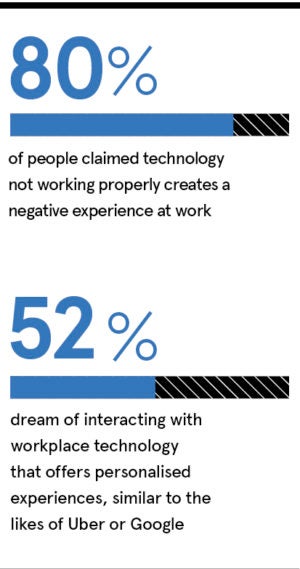Improving the employee experience is in the top three focus areas for global human resources leaders who want to support business growth in 2019, says Gartner. It makes complete sense: a happy workforce leads to improved productivity, greater talent retention and ultimately better customer experiences.
And there is solid research to back this up. Workplace futurist Jacob Morgan revealed findings in the Harvard Business Review showing companies focusing on employee experience had four times the average profit and more than twice the average revenue of those that didn’t.
Despite this evidence, the modern workplace doesn’t seem to be working when it comes to supporting workers, optimising space effectively and providing technology that enhances positive experiences for employees.
Without sensible, work-enabling technology, workplaces merely create friction; what McKinsey & Company call “organisational drag”. With one-size-fits-all workplaces simply no longer possible, workspaces increasingly need technology that enriches rather than enrages.
McKinsey says the average company loses 25 per cent of its productive capacity simply by putting people together in one place, dealing with all the inefficient policies and processes this entails, technology deficiencies included. Not only this, its research finds that with each additional 10 per cent increase in staff headcount, firms lose 2 per cent in productivity.
This all creates a strong case to create personalised working experiences for the workforce, designed to support individual as well as provide the best environment for everyone.

In the latest Cloudbooking report, we found more than half (52 per cent) of staff dream of interacting with workplace technology that offers the same sort of personalised experience they already get in their personal lives from the likes of Google or Uber.
The reality for a significant 59 per cent is that technology is not working as they expect and actually prevents them doing their jobs properly. If only they had bespoke technology-enabled experiences at work; this is what 61 per cent agreed would make them happier about coming to work each day.
While this may not be a huge surprise, the extent to which there is such high expectation about technology making working life easier possibly is. But it makes sense. At Cloudbooking we believe “Experience” is what employees crave and good experiences at that. Most workplaces simply aren’t working, but technology is now seen as leading the change to make things better.
Just as consumer technology is designed to be customer centric, the workplace technology your business adopts must be employee centric. It should solve the challenges of your workforce and be something your employees can’t live without.
This isn’t workplace fiction, it is workplace fact. And it exists for one simple reason: it’s what employees really want. In the same way we welcome eBay notifications about auctions ending soon or Facebook reminders telling us it’s a friend’s birthday, we are living in a time where relevancy is king. If technology is out of sight, but serves a purpose, people are clear: bring it on.
Take the relatively, in theory, simple task of attending an external meeting. It’s booked in an employee’s online calendar, scheduled for a few hours time, across town. But, unbeknown to them, transport problems are creating havoc.
How much easier would this employee’s life be if tech informed them of this and suggested that if they left now, rather than when they’d initially planned, they’d still get there on time? Or, what if, mid-journey, artificial intelligence predicts they’ll still be late, but that a co-working space with spare capacity was just a short distance away? At least they could decide to still have a Skype call instead. The technology would update the other attendees and book everything for them.
For chief executives and facilities managers, this is actually good news. With the type of technology infrastructure Cloudbooking provide, including tech that monitors where people go, which spaces are occupied, how often and by how many, decisions can be made more strategically using data. We believe this means employers have the opportunity to create even better experiences, with staff feeling they’re being set free by technology, rather than it being their master.
For more information please visit cloudbooking.com






